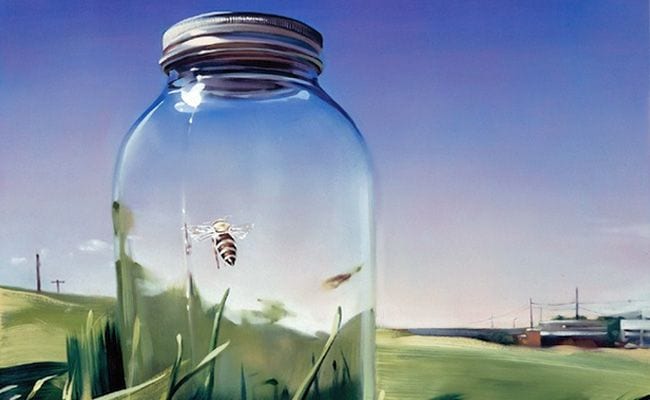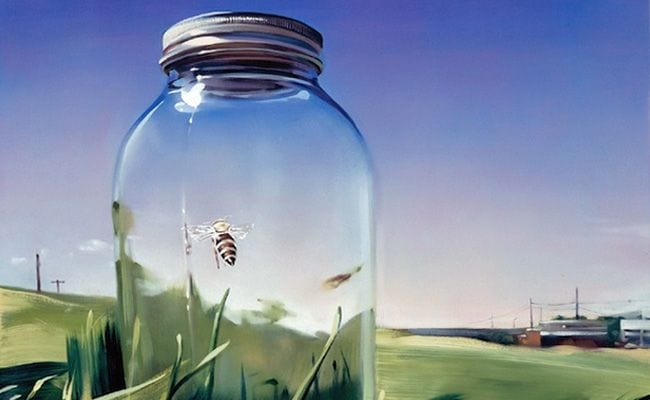
Nicole Walker’s Quench Your Thirst with Salt is barely 150 pages long, but it’s one of those books that can (and quite possibly will) make you look at the world a little differently. It’s often deeply personal, at times witty and in other places sobering. Perhaps most importantly, it provides a unique look at the relationship between this strange place we call Planet Earth and the (sometimes even stranger) people who occupy it.
Not surprisingly, Quench Your Thirst with Salt opens with the idea of water; the first essay begins with fish, moves to fishing, and ends with cooking fish. The second chapter continues the theme and is subtitled “a glass of water”: “Dad is filling his water glass for what must be the thirteenth time that night. Dad drinks a lot of water. He has water for breakfast, before he leaves for work, and starts drinking it again the minute he comes home. He’s always telling Mom to drink more water.” Walker then quotes an article from The Independent that details the importance of drinking water—it flushes out toxins, can help us lose weight, can make us look younger. It also, we learn next, looks a lot like vodka; which is it her father is drinking? She isn’t sure.
Other chapters examine skiing, water restrictions and swimming, birds, divorces, and the scattering of ashes. The book ends on a hopeful note, with Walker naming her first child Zoe, and explaining the significance of this name (it means life).
Often there is a lyricism—Walker describes things as vast as the beauty of Oregon and as small and seemingly insignificant as a feather. Sometimes there’s a blunt honesty—when Walker (in bullet format) lists average water usage in Utah (evidently Utahns use a lot more water than most Americans) or when she talks about seeing a teenage boy’s erection while swimming in her cousin’s pool.
Just as often there’s humor: “Once, on another camping trip, I’d scared away a bear before by singing Don McLean’s ‘American Pie’—probably bored him to death with all fourteen verses, or drove him mad by the off key of my singing voice.”
Sometimes Walker simply acknowledges the absurdities of our world. At one point she’s perplexed because she can’t rinse out a milk carton (and if she can’t rinse it she can’t recycle it) because of water restrictions: “I have to save water. The reservoirs are low. I can’t wash out the container just to recycle it.” She stands at the sink for 30 minutes before enlisting her dog’s help to clean out the container.
Given this anecdote, it’s not surprising that Walker seems somewhat obsessed with rules—knowing what they are and which ones we can break.
This is Quench Your Thirst with Salt–it’s a memoir, a scholarly article, poetry, a treatise on ecology and the environment, a cultural critique. It’s a bunch of things that probably shouldn’t work together but do. Walker finds ways to connect the seemingly unconnectable—dams with cervices, lakes with rehabilitation centers, gasoline with sneezing.
All of these parts work together to support Walker’s main point, a seemingly simple question in the fourth chapter: “How literally can you take the metaphor between land and the body?” For Walker, the answer appears to be quite literally. And despite the humor and the wonderful quirkiness, the book—perhaps not surprisingly considering how poorly we often treat all bodies—is often unsettling and deals with fears.
Walker’s “modern” fears still contain a trace of humor. While she’s afraid of bankruptcy, dropping her baby, and missing a grant deadline, she’s also worried that she’ll “offend her mother by telling her her bridge group seems slightly medicated.”
Her “real” fears are much more troubling, even though she has only two: “the threat of nature becoming completely obliterated and all things wild, especially predators, made extinct, and some ‘pervert’ molesting my daughter.” After mentioning these fears, Walker goes on to discuss (and connect) in a most disturbing fashion, Little Red Riding Hood, her first ultrasound, and ranchers killing wolves.
Walker then worries about her dog, which is part wolf, and her neighbor who, according to Utah’s sexual offender database, is a child rapist. She wishes she wasn’t having a girl and wishes she could “tell the difference between predator and suitor, between wolf and dog”.
Walker’s Quench Your Thirst with Salt is described, both on the title page and in the introduction, as a collection of essays. Still the term ‘essay’ seems almost a little bland considering what Walker gives her readers. Try not to open the book with any preconceived notions; just start reading and begin what will most likely be both a beautiful meander and an uncomfortable walk.


![Call for Papers: All Things Reconsidered [MUSIC] May-August 2024](https://www.popmatters.com/wp-content/uploads/2024/04/all-things-reconsidered-call-music-may-2024-720x380.jpg)



